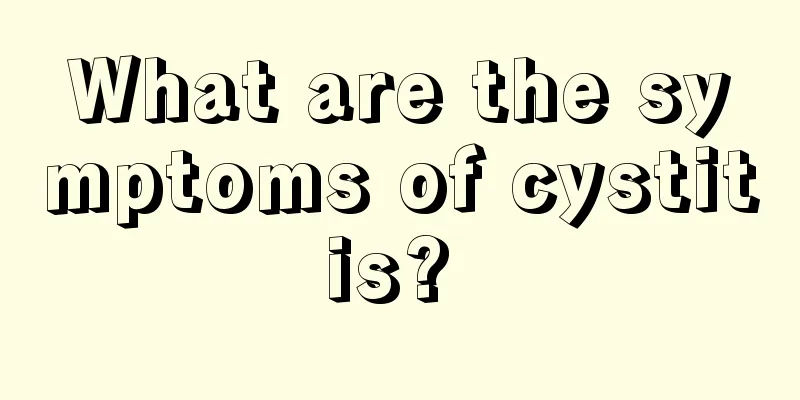What are the symptoms of cystitis?

|
Cystitis is a relatively common urinary system disease, and most of the patients are female friends. This disease is not a separate disease, but a part of the urinary system or a disease that triggers infection. Patients will feel pain when urinating, feel the urge to urinate, and have increased frequency of urination. These are some simple main characteristics that are relatively easy to see. So, what are the characteristics of cystitis? Its clinical manifestations are acute and chronic. The former has a sudden onset, with a burning sensation during urination and pain in the urethra area. Sometimes there is urinary urgency and severe urinary frequency. It is very important to note that the above symptoms occur both at night and during the day and are more common in women. Terminal hematuria is common. Sometimes there is gross hematuria and blood clots discharged. The patient feels weak and has a low or high fever, as well as suprapubic discomfort and back pain. Physical examination sometimes reveals discomfort over the pubic bone but no lumbar tenderness. Males may also have epididymitis or urethritis. Women with pelvic inflammatory disease are prone to recurring attacks. This requires going to the hospital for a urine test. The basic symptoms are summarized as: fever, general weakness, pain when urinating, back pain, and sometimes lower abdominal pain. Treatment method: Basically, three days of intravenous drip will be enough, but it depends on your personal constitution and you should see a doctor as soon as possible. (1) Acute cystitis: Acute cystitis develops suddenly, often after excessive fatigue, cold, prolonged urination, or sexual intercourse. The course of the disease usually lasts for 1 to 2 weeks and disappears on its own or after treatment. Its characteristics are "acute" onset, "severe" inflammatory response, and "shallow" lesion site. Common symptoms include frequent urination, urgency, pain, pyuria, terminal hematuria, and even gross hematuria throughout the entire process. In severe cases, the bladder spasms due to inflammatory stimulation, making it impossible for the bladder to store urine, resulting in frequent urination that cannot be counted, and a phenomenon similar to urinary incontinence. Because the site of acute inflammatory lesions is "shallow", the absorption capacity of the bladder mucosa is very weak, and frequent urination allows pyuria to be discharged in time, so the systemic symptoms of simple acute cystitis are mild and usually without fever. (ii) Chronic cystitis: The symptoms of chronic cystitis are similar to those of acute cystitis, but the degree is milder. It is characterized by a "slow" onset, "mild" inflammatory response, and "deep" lesion site. Check 1. Acute cystitis: The symptoms are mostly typical and diagnosis is generally not difficult. Based on the medical history of frequent urination, urgency and pain when urinating, routine urine examination may reveal red blood cells and pus cells, and a urine bacterial culture with a bacterial count of more than 100,000 per milliliter of urine can confirm the diagnosis. 2. Chronic cystitis: It is often secondary to other diseases of the genitourinary system. Therefore, in addition to general systemic examination, the most important thing for diagnosis is to find out the type of pathogenic bacteria and the results of drug sensitivity tests, and to find the causes of persistent or recurrent infection. Chronic nonspecific cystitis must be differentiated from specific cystitis, such as tuberculous cystitis, interstitial cystitis, and Trichomonas and fungal cystitis. If it is acute, what the patient needs to do is to rest more, drink more water, pay attention to nutrition, and avoid eating irritating foods. You can take a tub bath when you shower, which can alleviate the symptoms. Relying solely on medication cannot achieve a cure, so you need to find out the cause of the infection in time, take correct treatment measures, and improve your own resistance to prevent continued attacks. |
<<: What is the best way to treat thrombocytopenia with immunoglobulin?
>>: Can congenital hemolytic anemia be inherited?
Recommend
We need to understand the causes of kidney cancer
Kidney cancer, also known as renal cell carcinoma...
What to do if my waist hurts from holding a baby
Since babies do not have normal mobility after bi...
What to do if double eyelid surgery fails
In life, many women are particularly fond of beau...
Is it useful to drink glucose after drinking too much alcohol?
When you drink too much, you will feel a severe h...
What is the cause of eye pain? What causes it?
Sometimes, many friends will feel swelling and pa...
Be careful of these signs of sexual indifference!
Sex is full of mystery for many people, but it is...
What is the best way for teenagers to lose weight
The problem of excessive obesity among teenagers ...
What is the reason for pimples on the face
It is normal to have acne on the face. Because th...
Several common chemotherapy methods for colon cancer
Chemoradiotherapy is a commonly used treatment me...
Can patients with high blood lipids eat peanuts?
High blood lipids can be said to be a common prob...
Can ginger soaked in vinegar cure bone spurs?
In real life, bone spurs are a very common bone d...
What is the cause of thick yellow tongue coating and oral ulcers?
The tongue coating can well reflect our physical ...
What are the hazards of hair treatment ointment
Hair can keep our scalp warm and protect it, but ...
What are the early symptoms of liver cancer? Can B-ultrasound detect early liver cancer?
Liver cancer is currently one of the top three ma...
Where is the nasal septum
The nasal septum is a key part of the human body....









